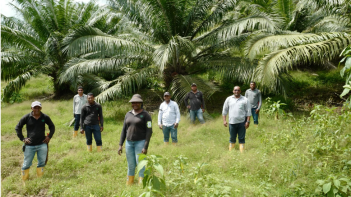In celebration of “Orangutan Caring Week”, a roadshow at Nanjiing’s Hongshan Forest Zoo highlighted sustainable palm oil as a key to orangutan and biodiversity protection, as well as a healthy natural environment as the first line of defense against future pandemics.
NANJING, 16 November 2021: The Roundtable on Sustainable Palm Oil (RSPO), Wildbound, a Beijing-based sustainability and education venture, and the Hongshan Forest Zoo in Nanjing hosted a roadshow on Sunday 14 November to promote the importance of sustainable palm oil for the protection of orangutans and their habitats, and to raise public demand for sustainable products.
The event was held in the Hongshan Forest Zoo’s Orangutan Museum in China, as a closing ceremony for “Orangutan Caring Week,” celebrated from 7 to 13 November, the theme of the week was “Respecting Nature To Save Orangutans, Biodiversity and Our Collective Future” in relation to the COVID-19 pandemic. This helped heighten the public’s understanding of how our health and that of the planet are linked to maintaining and respecting biodiversity in all forms.
During the event, Wildbound’s Changemakers for Nature programme, the Zoo’s environmental protection concept, and information about the role of RSPO were presented as important solutions for the protection of orangutans. To encourage the audience’s participation and engagement, a game session with prizes was organised by the Zoo.
In addition to raising awareness of RSPO certified sustainable palm oil, the roadshow initiative also aims to increase the awareness and understanding of sustainable consumption through public education and engagement.
Palm oil is well known for its versatility of use in various consumer products, including cooking oil, snacks, shampoo, cosmetics and home care products. It is also widely used due to its high yield efficiency compared to other vegetable oils. However, traditional oil palm cultivation practices have caused environmental and social problems that sparked a call for positive, sustainable change to be implemented, including zero burning policies, halting deforestation, preserving peatlands and protecting human and labour rights, which are just some of the criteria under the RSPO’s certification standards.
When oil palm is grown sustainably and in line with the RSPO Principles and Criteria (P&C) standards, a space is created where palm oil agriculture and the environment can co-exist, primary and secondary forests are protected, and wildlife habitats such as that of the orangutan are not harmed.
Until such time as sustainable palm oil becomes the norm, consumers need to be supported in their choices and offered ways to identify which products are contributing to the production of Certified Sustainable Palm Oil (CSPO), and thereby reducing the negative social and environmental impacts of conventional oil palm cultivation. Labeling products that contain CSPO and the use of the RSPO Trademark provides a clear identification of which products contain “good” palm oil.
In this renewed drive towards sustainable consumption, including the use of palm oil and sustainable palm oil, producers’ awareness and approach is also critical. They should ensure that their supply chain thoroughly implements sustainability practices, abide by rules and regulations, and start delivering sustainable products that consumers can identify.
Life on Earth linked to a healthy planet
As stated on the Young People’s Trust for the Environment’s website, one way of explaining biodiversity is the phrase: “When we tug at a single thing in nature, we find it attached to the rest of the world.” All living creatures need other creatures and plants in one way or another — even if the connection is not always clear. Biodiversity is about the wide range of various living things and systems in an area. The more plant, insect and animal species exist in one area, the greater the biodiversity and thus, the healthier the ecosystem is.
Orangutans live in harmony with nature. On the other hand, people have been living in discord with the environment because of unsustainable lifestyles and choices, in spite of needing nature for their existence. Due to human activity, orangutan populations have declined by more than half over the past 60 years, and their habitat has been reduced by at least 55% over just the past 20 years.
With the climate crisis threatening the mass extinction of thousands of animals and plant species as well as human populations, bold action is more urgent than ever.
Great apes in danger
Although the COVID-19 virus has not yet been observed in great apes in the wild, there is abundant scientific evidence showing that our closest living relatives are susceptible to diseases transmitted by humans.
Richard C. Paddock, in his article, “Virus Delays Orangutans’ Long Awaited Return Home” published in the New York Times in May 2020, indicated that scientists fear that the virus, which is thought to have originated in bats and jumped to humans, could just as easily jump to great apes, including gorillas, chimpanzees, bonobos and orangutans, which share 97 to 99% of their DNA with humans.
The combined impacts of habitat loss, habitat degradation, illegal hunting, and the illegal pet trade have pushed the orangutan toward an extremely high risk of extinction in the wild. They now face a new possible threat of a disease that could add to that risk.
Orangutan rescue and rehabilitation centres are taking every precaution to protect orangutans in their care, as well as staff and caretakers from possible transmission of the coronavirus. However, expenses are high, and they are facing extra challenges in these difficult times. With revenues down, they are dealing with added expenses for food, gowns, gloves, testing, as well as other medical and cleaning supplies directly needed due to the pandemic. Centres are still taking in rescues yet they are not able to release captive orangutans ready to be reintroduced back into the wild, for fear of spreading the virus to wild populations, further challenging already limited space situations.
Nature: first line of defense against future pandemics
To contain this virus and to stop the next pandemic, steps need to be taken to start protecting wildlife habitats. Some of the deadliest new diseases, including COVID-19, Ebola, SARS, and HIV, all arose when man had encroached on the natural habitats of animal populations. It is therefore imperative to grant critically endangered species their right to safe, thriving habitats, protected from human interference.
By saving orangutans, we save ourselves and our life sustaining environment. If we can protect and save this closest evolutionary cousin and their rainforest homes, it would mean we are making the necessary changes to possibly protect all life on earth.
Orangutan Caring Week was a perfect opportunity to spread awareness about the plight of orangutans and the urgent dangers facing their rainforest homes with the goal of motivating people to care, and to care enough to be moved to action.
We need to express our concern and create positive change through activities and initiatives that go beyond mere talk. For some people, learning about the issues for the first time may require discussion and discourse. However, for many people who have been hearing about this species’ plight for survival, talk may not be enough.,Action is needed to save the orangutan and their rainforest habitats. If ever there was a time to care, that time is now.
About RSPO:
The Roundtable on Sustainable Palm Oil (RSPO) was formed in 2004 with the objective of promoting the growth and use of sustainable oil palm products through credible global standards and engagement of stakeholders. RSPO is a not-for-profit, international, membership organisation that unites stakeholders from the different sectors of the palm oil industry including oil palm producers, palm oil processors or traders, consumer goods manufacturers, retailers, banks and investors, environmental or nature conservation NGOs, and social or developmental NGOs.
This multi-stakeholder representation is mirrored in the governance structure of RSPO such that seats in the Board of Governors, Steering Committees and Working Groups are fairly allocated to each sector. In this way, RSPO lives out the philosophy of the “roundtable” by giving equal rights to each stakeholder group, facilitating traditionally adversarial stakeholders in working together to reach decisions by consensus, and achieving RSPO’s shared vision of making sustainable palm oil the norm.
The seat of the association is in Zurich, Switzerland, while the secretariat is currently based in Kuala Lumpur with satellite offices in Jakarta (ID), London (UK), Zoetermeer (NL), Beijing (CN) and Bogotá (CO).
For further information, kindly contact:
| RSPO Communications Team | Nicholas Hurt
Head of Stakeholder Engagement |
Keep reading

Access into prisma

Updated Trace Function in prisma

Call for Expression of Interest: Independent Investigation of a Complaint

Latin American Smallholders, Key Global Brands Gather in Peruvian Amazon to Advance Sustainable Palm Oil

RSPO Forum for Members and Certification Bodies 2025: Strengthening Capacities and Building Bridges with RSPO Members

From Violence to Prosperity: Cultivating Sustainable Palm Oil in San Pablo, Colombia

Palmas de Tumaco: Enduring, Trusting, and Transforming in Colombia’s Pacific Coast
Carry Over Credits for Certified Independent Smallholder Groups




